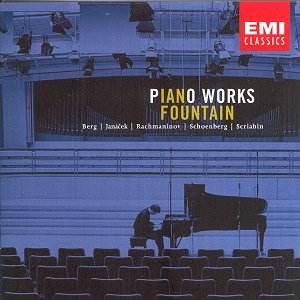The first thing to strike me as I put this disc into
the player and perused the booklet, was the intelligent programming
of the recital. As individual items, all the works here have had their
share of attention from some great pianists, but itís amazing how well
they hang together as a whole. A cursory glance at the dates of composition
is enough to reveal that a mere eight years separates all the works,
and it was presumably Ian Fountainís intention to show us just how some
of the greatest musical minds of the 20th Century were responding
to events around them.
It virtually goes without saying that the most conservative
item here is the Rachmaninov, which opens the disc, though even here
we get an inkling of harmonic restlessness. I have always preferred
the longer (by 116 bars) original version of the score, probably because
of the stunning advocacy of it by Zoltán Kocsis, whose Philips
disc is one of the glories of the Rachmaninov discography and a favourite
of mine. Fountain follows a trend started (I assume) by Horowitz, who
incorporated parts of the original into the revision, trying to get
the best of both worlds, something which works best in the tightened
up finale. Fountainís performance lacks nothing in technical virtuosity,
and his keen musical probing delivers many interesting things. The very
opening sets the tone, where a grand downward flourish gets the gloriously
sprawling first movement out of the blocks. If he seems a shade careful
at the side of Kocsis, whose rhapsodic brio and frenzied propulsion
are hard to resist, then there is still much to admire. He sets a more
careful pace, allowing the long breathed romantic phrases to unfold
with loving care and detail; listen to 3í45 into the first movement,
where Fountainís handling of the haunting second subject is as sensitive
to nuance as could be imagined. He does allow himself some indulgence
in the Allegro molto finale, though the frenetic maelstrom conjured
by Kocsis is here only hinted at.
The rest of the disc is given over to music which exemplifies
the nervous instability of much early 20th Century music.
The JanŠček is particularly interesting,
especially as it has a history almost as dramatic as the events which
inspired it. The subtitle, From the Street commemorates
a student demonstration in which a 20-year-old worker was killed, an
event which so outraged the composer that he wrote a three movement
sonata as an expression of his feelings. Though he later destroyed the
finale, the two movement torso that survives is a powerful document.
It is obvious from a note in the booklet that this piece is a favourite
of Fountainís, and his excellent performance is full of barely suppressed
anger. He turns the first movement into a defiant roar, using JanŠčekís
highly individual musical language (those chattering repetitions, little
fanfare figures, quirky harmonies) to summon up a restlessness and bitterness
that are wholly convincing.
The Schoenberg and Berg items are closely related,
both musically and spiritually. For Schoenberg (as with other composers),
the piano was the medium for experiment, and his Op.11 Piano Pieces
are often cited as marking his decisive break with tonality. One senses
the past in the rich, Brahmsian chording, but the chromatic wandering
is so extreme, the tonal questioning so intense, that we really do feel
change in the air. Fountainís performance is mercurial, delighting in
these very extremes of dynamic and pulse. His main competition comes
from another glory of the piano catalogue, Peter Hillís outstanding
Naxos recital of Second Viennese piano music. The two renditions of
Op.11 are as chalk and cheese, with Hill taking half as long
again as Fountain, and content to play on the romantic past associations
in the music, like ghosts hovering on the perimeter. Fountainís version
puts the music firmly in the 20th Century, and his shifts
of light and colour make for very satisfying listening; hear how he
treats the progress of the sombre two note ostinato that dominates the
second piece, so much quicker than Hill, but somehow naggingly appropriate.
The Berg Sonata has been called Ďmusic historyís
most extraordinary Op.1í, and I would not argue. The debt to Schoenberg
(as well as Wagner) is obvious, but the sheer concentration of material,
the conscious working out of old and new traditions into a cohesive
whole, is inspired Ė this 11-minute wonder encapsulates the 20th
Century crisis. Hillís and Fountainís performances are here remarkably
similar, with Fountain having a slightly more aggressive quality, at
least regarding dynamics, but both are eminently satisfying.
The Scriabin Seventh Sonata, which ends the
disc, represents another highly individual voice of the 20th
Century, one that in its own way is just as searching and influential.
Again, concentration is the key word (none of the 10 sonatas lasts more
than a dozen minutes), and the composer packs a lot into this amazingly
short time span. The results are very different, with the score packed
with directions (all in French) such as mystérieusement sonore,
orageux, avec une céleste volupté, extatique etc.
This outpouring of celestial ecstasy is exactly what Ian Fountain delivers,
a stunning performance that balances the frenzy and the control to perfection.
The last section, which is phenomenally difficult even to decipher (itís
mostly on three staves) is delivered with an abandon that marks out
the best Scriabin interpretations, and this approach in the Rachmaninov
would have made the disc a world-beater. As it is, this is mightily
impressive piano playing.
The Debut series is really coming of age, with very
few releases that are less than recommendable. The present disc is worth
acquiring even if, like me, you already have most of the music. This
is an artist with much to offer, not least his probing musical intellect
and enviable technique. Couple this with such intelligent programming
and excellent engineering, and your fiver will feel like itís going
a very long way.
Tony Haywood
